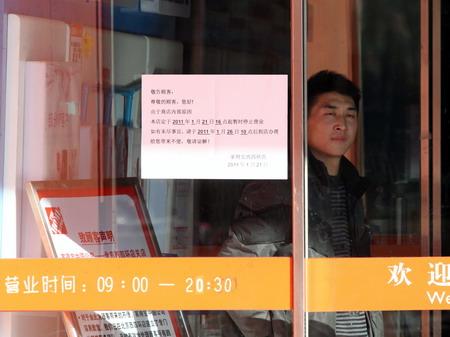
A sign posted on the door of Home Depot Chinaos last Beijing store. [Photo: China Daily]
US home-improvement giant Home Depot Inc has closed its last Beijing store due to operational difficulties.
The company announced the closure on Jan 21. A manager at the store has confirmed that it closed on Tuesday and had laid off most of its employees by Wednesday.
A woman who arrived Wednesday to ask about the delivery of her purchases was told by the manager that the store would start handling customers' requests on Thursday.
Home Depot China could not be reached immediately for comment.
The Beijing Times reported on Tuesday that Home Depot China had closed the last store in Beijing after evaluating its business and financial conditions, but outlets in other regions such as Tianjin, Xi'an and Zhengzhou will remain open.
The US company acquired a local peer, The Home Way, in 2006 and took over its 12 outlets in China.
However, it has closed five outlets since 2009, the news website Sina.com said.
Raymond J. Chou, president of Home Depot China, was quoted in September on the property website Soufun.com as saying that the company would make adjustments, but would be committed to long-term development in China.
Liu Hongzheng, a retired military officer, paid 6,000 yuan ($909) for a bathtub and cupboard for her apartment, but she said she does not like the store's superstore culture.
"I think most Chinese prefer hiring a decoration company rather than going the do-it-yourself way," Liu said. "Shopping assistants here are not enthusiastic about giving advice."
Mike Bastin, a visiting professor of brand management at China Agriculture University, told China Daily that Home Depot in Beijing has not adapted to what is a very different home-improvement market here compared with the United States.
"For example, Chinese homes typically do not have a kitchen anywhere near the size of a typical US kitchen, and new homes in China often come with most of the furnishing work already completed. This, and other differences, has huge implications for brand management and consumer behavior in China," Bastin said.
Bastin added that foreign home-improvement companies need to immerse themselves in Chinese culture and the changes taking place in Chinese lifestyles, and "forget" just about everything they learned in other countries.
Chen Jia, a commercial public-relations manager at Ikea China, told China Daily that customers in major cities have many choices, and his company has made efforts to respect their buying habits.
"Chinese customers do not like to buy all their home-improvement products in a one-stop shop, so we are thinking about setting up shopping malls," Chen said.
Ikea is expected to open three regional shopping centers: in Wuxi, Jiangsu province in 2013; in Beijing's Daxing district in 2014; and Wuhan, Hubei province, in 2015. In addition to Ikea stores, the centers will have outlets for fashion, food, home electronics and entertainment.
"Having localized operations is an important consideration for us," Chen said.
Related News
Photos
More>>trade
market
- Ganfeng Lithium CO.,LTD is listed on Shenzhen Stock Exchange
- Li Anze met Xie Baojun,Chairman of the board of Henan Hengxing Science Co., Ltd
- New march to the Taiwan stock market
- Mr. President Invites You to Attend the Lecture ---Professor Zhou Xiaozheng
- The President of CNU Invites You to Attend a Lecture: Zhou Xiaozheng Comments on





